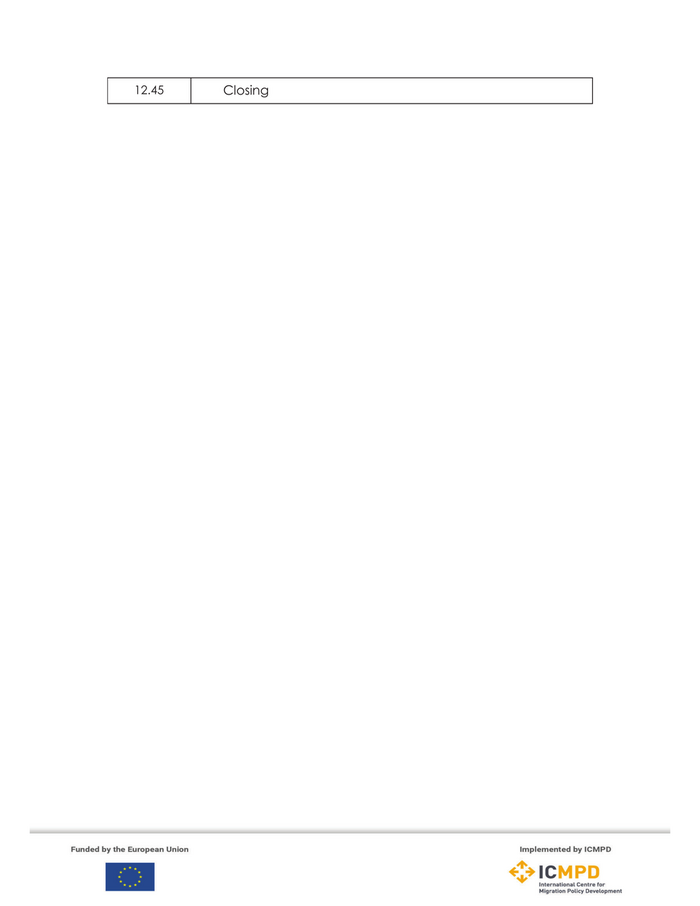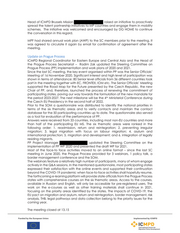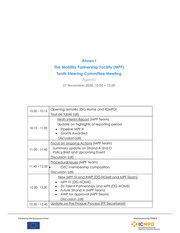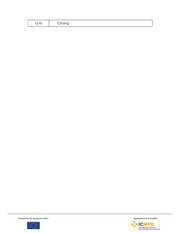mpf10thsteeringcommitteemeetingminutes112020fl-redacted
Dieses Dokument ist Teil der Anfrage „correspondence ICMPD“
Ref. Ares(20224695297 - 27/06/2022 Tenth Steering Committee Meeting 27 November 2020, 10.00 -— 13:00 Online Meeting via WebEx Minutes Funded by the European Union Implemented by ICMPD » Es <>ICMPD f jon Policy Development

Participants @ec.europa.eu DG HOME @ec.europa.eu DG NEAR @ec.europa.eu DG DEVCO @ec.europa.eu DG HOME @ec.europa.eu DG HOME @ec.europa.eu DG HOME @eeas.europa.eu EEAS @ec.europa.eu DG HOME @icmpd.org ICMPD @icmpd.org ICMPD @icmpd.org ICMPD @icmpd.org ICMPD @icmpd.org ICMPD @icmpd.org ICMPD @icmpd.org ICMPD @icmpd.org ICMPD @icmpd.org ICMPD Record of Proceedings Head of ICMPD Brussels Mission – extended a welcome to all the participants to the 10th MPF Steering Committee Meeting, taking place in virtual environment via the WebEx online tool, due to the COVID-19 pandemic restrictions. The meeting started with a virtual “Tour-de-Table” – participants presented themselves and the institutions they represented. MPF focal point in DG HOME – extended her warm welcome to the participants and made opening remarks with special focus on EU Migrations Pact and its priority areas such as: legal migration and mobility, protection systems, resettlement and humanitarian evacuation, fight against irregular migration, enhancing border management, boosting economic opportunities, return, readmission and reintegration. Mrs. Silvena Pesta stressed that capacity building, development assistance, boosting economic opportunities and enhancing global partnerships are crucially important to meet the EU migration objectives. In term of geography, eastern neighbourhood, Western Balkans, Tukey and Silk Route countries remain as priority areas; MPF is one of the highly relevant tools where the European Union employs towards external aspect of migration through enhancing legal migration pathways, contributing to capacity building in different areas of migration and supporting job creation in partner countries. Head of ICMPD Brussels Mission, stressed positive aspects with regard to the implementation of MPF since last Steering Committee meeting, namely the adaptability and flexibility that the Mobility Partnership Facility has shown during COVID-19 pandemic. Number of activities and online events having been organised

by Prague Process, as well as addressing the needs of implementing partners in terms of contractual frameworks/extensions/amendments are examples of that. MPF Senior Project Manager introduced the agenda topics (see the meeting agenda) and opened the meeting with key highlights of the MPF project since June 2020 (previous Steering Committee Meeting). Key highlights of the last 6 months x MPF contributed to the focus session on talent partnership on Vienna Migration Conference x Policy brief on lessons learned on mobility pilot projects has been prepared and published on MPF website1 x 3 Webinars, 1 Policy talk and 3rd Border Management Conference have been held by the Prague Process and MPF, more are planned in 2021 x Nearly all funds of MPF III will be committed in 2020 Overview of Pipeline and Newly Approved Grants There are new lead applicants (e.g. Slovakia, Germany and the Netherlands) as well as new target countries (e.g. Ethiopia, Capo Verde, Senegal, the Gambia) in the pipeline. Besides, some of the ongoing pilots are testing scalability and sustainability by applying for the second phase of the mobility projects (e.g. MENTOR II, Digital Explorers). DG HOME raised the idea of merging the applications with the same target or lead countries (e.g. Portugal-Gambia and Portugal Cabo Verde or several initiatives implemented by Spain in Morocco) for the purpose of economy of scale; MPF team clarified that this decision can only be left up to the applicant EU Member States. High demand is shown for Strand A funds especially in border management dimension as well as migration and development, social protection, social entrepreneurship with engagement of diaspora. Total value of projects in the existing pipeline exceeds available funding under MPF III. Some of them (especially the ones that are on early incubation and concept development phase) will move to the MPF IV depending on submission date. Applications are received on rolling basis - when funds are exhausted under MPF III, they will move to MPF IV, under new guidelines, with new funding decision. The award decision is published on MPF website only after the completion of contracting phase, which takes approximately 3 month from the date of receiving the applications. The website will be updated to indicate that MPF III is not taking further applications and that interested actors should contact the MPF team directly. New guidelines will be published for MPF IV. DG HOME stressed that it is important that political agenda is taken into consideration in terms of submission timeline, in order to avoid “first come first serve” principle. It was agreed MPF will continue sharing the up-to-date pipeline to DG HOME on monthly basis. Under MPF III, four projects have been awarded: Strand A: 1 Publican is available here: https://mobilitypartnershipfacility.eu/what-we-do/publications/partnerships-for- mobility-at-the-crossroads-lessons-learnt-from-18-months-of-implementation-of-eu-pilot-projects-on-legal- migration

1) “Migration Management Diploma Program” implemented by Maastricht University for the benefit of MP and CAMM countries, launched in November 2020 (AMIF) 2)“Enhancing capacities of border police forces to detect forged Identity and travel documents” implemented by State border Guard of Lithuania and State border Guard of Moldova, contracting phase, under ISF- Borders Strand D: 1) “Move Green” implemented by Fondo Andaluz de Municipios Para La Solidaridad for the benefit of Morocco, contracting phase, under AMIF 2) “Mentor II” implemented by the Municipality of Milan for the benefit of Morocco and Tunisia, contracting phase, under AMIF DG HOME requested the update on the participant list of MMPD program, which MPF will provide in January 2021, based on results on shortlisting by MU. Ongoing Projects Strand A: LATBEL is at the no-cost extension stage, contract amendment process is ongoing. The project is facing two challenges: 1) political situation in Belarus and 2) COVID-19 pandemic. Hockey championship (planned in April 2021) that was a key target event of the action, will be cancelled because of the political situation. Latvian side is looking into the possibilities of remote activities and trying to find the best ways of the wrap-up of the project. PROMETHEUS has recently requested a contract amendment to include additional activities related to the new Schengen rules and newly introduced checks on departure points in Georgian airports. Training design has adapted to the COVID-19 pandemic restrictions – trainers, not being able to travel from France, were replaced by retired French border experts who are residing in Georgia. INSIGHT has had a very positive impact on the relationship between Italy and Sweden regarding cooperation on trafficking issues. Longer-term bilateral engagement is now expected. The help-desk in Nigeria continues to provide support to victims of THB. Three key reports are being drafted and will be available in Italian and English languages. Project will seek a 9 months extension; budget will be submitted and revised by MPF to check the balance and availability of savings for new activities. This will allow a final event to be held in person to strengthen the impact of the project and the networks it created. B1: JEMPAS has been strongly affected by lockdown, 6 months extension is anticipated to catch up on implementation and move forward with planned activities. Strand D: Most of the projects are approaching the final stage of implementation following no-cost extensions. Digital Explorers: 15 participants completed 1 year employment, 11 of them retained in Lithuania, either extended the employment relations within the same company or found another job; 3 participants already returned to Nigeria

The project has added a new activity stream to address the slight imbalance in gender; with additional placements for 10-15 female data sciences are envisaged. For a new project, likely to be prepared in early 2021, stakeholders seem engaged and interested to continue cooperation and extend the project through the Baltic region and explore the opportunity of including other African countries- including perhaps Ghana. PALIM has been heavily affected by the pandemic, the target number of mobility was originally 30 candidates, but has not materialised due to the shift of private sector priorities and COVID-related uncertainties. At the moment, there are 1 or 2 potential matches between the companies and candidates, that demonstrates continuous efforts from partners, but the initial target number is unlikely to be met. HOMERe was also strongly affected by the pandemic, the initial target of 250 students was only partially met – with 50 interns from Morocco and Tunisia have completed the programmes. MPF is launching an external evaluation to build on the learnings and analyse the main challenges. Young Generation as Change Agents has reached the target of 58 candidates. Although, the challenges of Moroccan private sector caused by the pandemic, negatively affected the return and reintegration phase of the project. Implementing partners are trying to find the ways to adapt to the situation. The project created additional economic value because of the extended stay of students in Spain. MPF offered necessary flexibility and various options to the beneficiaries as a possibility to recover from the “loss” of COVID. Policy Brief and Upcoming Event MPF published a policy brief “Partnerships for Mobility at the Crossroads”. The publications captures the main lessons learnt during the first 18 months of implementation and analyses the different methodologies having used by the implementing partners to address the forming of partnerships. The main findings are the following: - Diversification of approaches will bring additional value to the mobility projects; potential use of new methodologies should be fully absorbed while scaling up and bringing more regionalisation - Due to the number of stakeholders and engaged parties, timing and flexibility remains as a challenging factor for almost all the implementing partners; sectoral variety of stakeholders as well as first-time cooperation attempts require some time to build trust among the involved parties - There is a need to invest in capacity building and ensure effective coordination and communication among the participating countries, it will potentially result in economies of scale and grouping up of several countries. Technology tools and compatible software should be explored for skills matching - There is a significant difference between private and public sector approaches in terms of job creation and recruitment methodologies. Recruitment agencies and legal pathways are already explored by private sector companies, there is a potential to learn from them and apply those methodologies for public employment agencies - Dedicated monitoring and evaluation system should to be set up for pilot projects. Solid M&E system will help to assess the results and analyse more profound indicators than e.g. numbers of mobility. It will help to capture the added value of the mobility pilot projects. With input and engagement by DG HOME, ICMPD will organise a large scale, multi-

stakeholder online event by the end of January 2021 to share the learnings and continue reflection. Procedural Issues (Membership of GEC) MPF presented an overview of grant evaluation procedures and timelines to SC members. In addition, MPF team and the Resources Management Unit of ICMPD flagged the recent challenge of unavailability of MPF Steering Committee members for grant application evaluations. The issue was especially relevant for stand D applications where there is a minimum of 5 evaluators as standard for the Committee. Recently the issue of unavailability was addressed by replacing the EEAS evaluator with a representative of the EU delegation in relevant target country and in another instance by exceptionally reducing the number of evaluators from 5 to 3. EEAS took a note of the mentioned procedural matter for internal discussion within the division. An email will be sent by DG HOME and to the EEAS confirming the procedures for evaluation and seeking their input on how future representation would be configured. New MPF IV and AWP Based on the lessons from grant making, several new elements are envisaged in of the guidelines for MPF IV: - Concept note should be introduced as a formal step to ensure that applications are relevant and strategic, this will lead to two stage approach – once the relevance and strategic importance are confirmed, the potential applicants will be given a green light to submit a full application - For Strand A, MPF will seek guidance from DG HOME and SC to target funding further. The equipment purchased under the project should be linked to the capacity building and in general the it is desirable to decrease the share of equipment in grant applications - For Strand D, guidelines for applications will be modified in order to ensure the alignment with current Talent Partnership needs; there might be some deadlines introduced in the open call in order to encourage competition as well. Separate meeting/workshop will be organised by MPF specifically on streamlining the guidelines for MPF IV. - Evaluation criteria will be modified and issues such as the project governance together with sustainability and scalability will likely become key elements for Strand D proposals. Procedural issue: MPF II and MPF III addenda is with DG HOME. MPF is looking for some restructuring of MPF II and no cost extension for MPF III in order to offer durability to strand D projects and allow signing contracts with MENTOR II, GREEN MOVE and others for 36 months. DG HOME confirmed the amount of MPF IV – MEUR 20 under AMIF, EUR 500K under ISF- border and EUR 500K under ISF-Border. The signature of the contract should be feasible early 2021 but the proposal needs to be updated, some substantial issues like EU Migration Pact and talent partnerships need to better addressed therein. DG HOME requested that IMCPD send updated proposal together with the budget now that this information is available in order to put the proposal into the DG HOME pipeline and proceed with signature.

Head of ICMPD Brussels Mission raised an initiative to proactively spread the talent partnership initiatives to MP countries and engage them in mobility schemes. The initiative was welcomed and encouraged by DG HOME to continue the conversation in this regard. MPF had shared annual work plan (AWP) to the SC members prior to the meeting. It was agreed to circulate it again by email for confirmation of agreement after the meeting. Update on Prague Process ICMPD Regional Coordinator for Eastern Europe and Central Asia and the Head of the Prague Process Secretariat – Radim Zak updated the Steering Committee on Prague Process (PP) implementation and work plans of 2020 and 2021. Since the last SC meeting, the key event organised within PP was the Senior Officials’ Meeting of 16 November 2020. Significant interest and high level of participation was shown in terms of attendance: 80 Senior level officials from 36 different countries took part in the meeting together with EC, FRONTEX, IOM etc. The Senior Officials’ Meeting supported the Road Map for the Future presented by the Czech Republic, the new Chair of PP, and, therefore, launched the process of renewing the commitment of participating states, paving our way towards the formulation of the new mandate for the period 2023-2027. The next milestone will be the 4th Ministerial Conference during the Czech EU Presidency in the second half of 2022. Prior to the SOM a questionnaire was distributed to identify the national priorities in terms of the six thematic areas and to verify contacts and maintain the contact database for the 50 participating countries up to date. The questionnaire also served as a tool for evaluation of the performance of PP. Answers were received from 33 countries, including most non-EU countries and more than half of the participating EU MS. The six thematic areas were ranked in the following order: 1. readmission, return and reintegration; 2. preventing irregular migration; 3. legal migration with focus on labour migration; 4. asylum and international protection; 5. migration and development; and 6. integration of legally residing migrants. PP Project Manager updated the Steering Committee on the implementation of PP WP 2020 and presented the draft WP for 2021. Most of the face-to face activities moved to an online format – since the last SC meeting in June 2020, the Prague Process provided for 3 webinars, 1 policy talk, a border management conference and the SOM. The webinars feature a relatively high number of participants, many of whom engage actively in the Q&A sessions. In the mentioned questionnaire, most participating states expressed their satisfaction with the online events and supported their continuation beyond the COVID-19 pandemic when face-to-face activities shall hopefully resume. The forthcoming e-learning platform will provide state officials from the Prague Process states with comprehensive courses on the six thematic areas. Access to the courses, available in Russian and English, will only be accessible for pre-registered users. The work on the e-courses as well as other training materials shall continue in 2021, focusing on the priority areas identified by the states. The impacts of COVID-19, the EU pact on migration and asylum, return and reintegration, border management, risk analysis, THB, legal pathways and data collection belong to the priority issues for the coming year. The meeting closed at 13.15

Annex I The Mobility Partnership Facility (MPF) Tenth Steering Committee Meeting Agenda 27 November 2020, 10.00 – 13.00 10.00 - 10.15 Opening remarks (DG Home and ICMPD) Tour de table (all) Ninth Interim Report (MPF Team) Update on highlights of reporting period 10.15 -11.00 x Pipeline MPF III x Grants Awarded Discussion (all) Focus on ongoing Actions (MPF Team) 11.00 - 11.45 Summary update on Strand A and D Policy Brief and Upcoming Event Discussion (all) Procedural Issues (MPF Team) 11:45 – 12.00 x GEC membership composition Discussion (all) New MPF IV and AWP (DG HOME and MPF Team) x MPF IV (DG HOME) 12.00– 12.30 x EU Talent Partnerships and MPF (DG HOME) x Future Strand A (MPF Team) x AWP for approval (MPF Team) Discussion (all) 12.30 – 12.45 Update on the Prague Process (PP Secretariat)
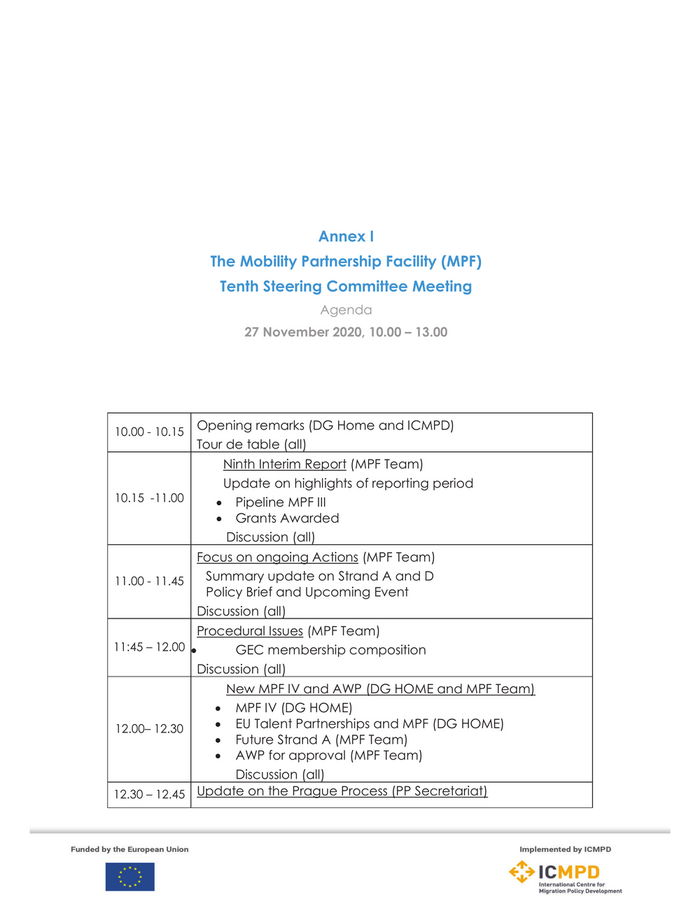
12.45 Closing
